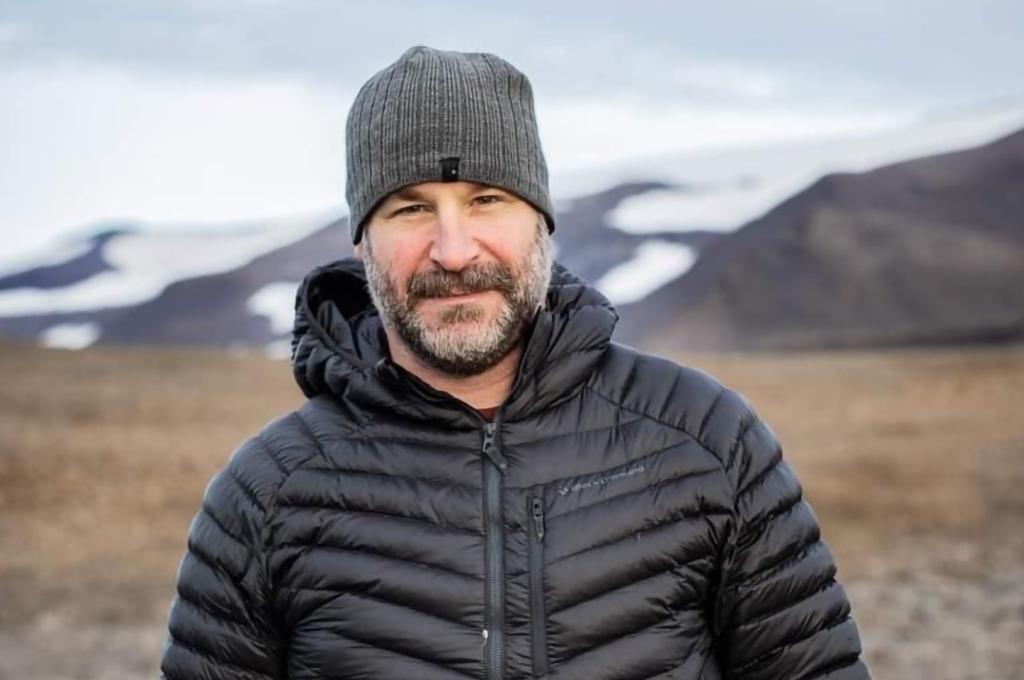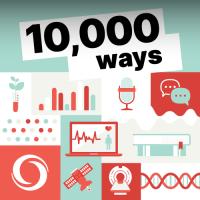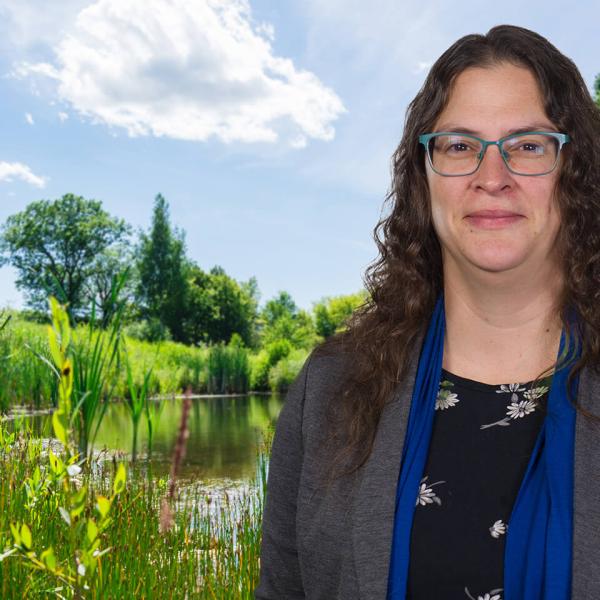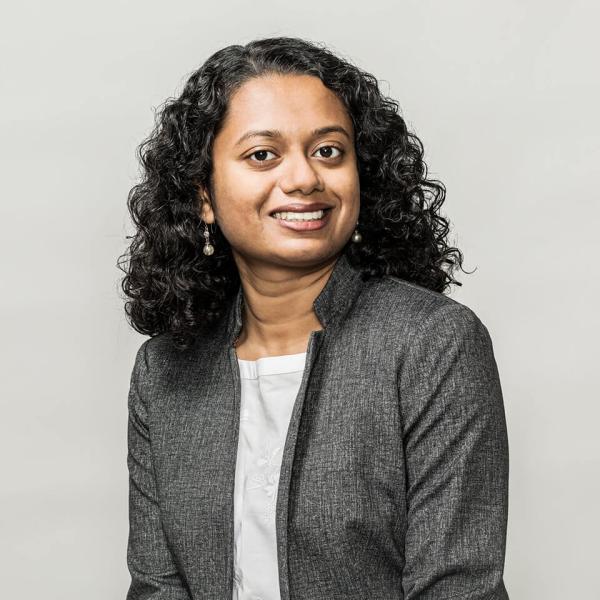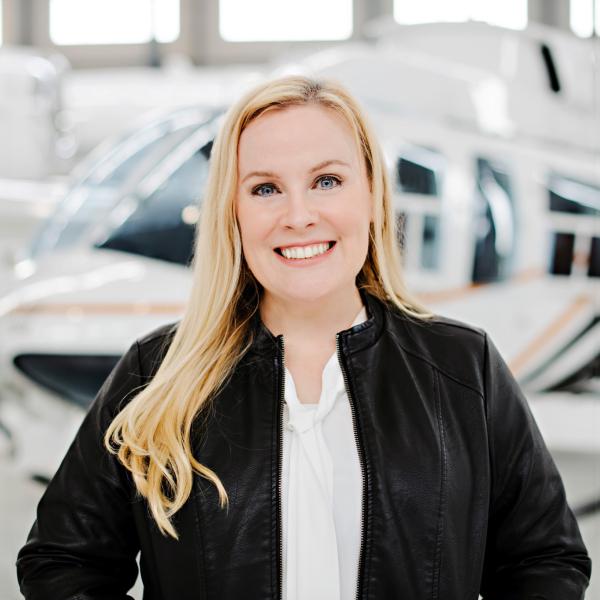HOST
This is a Canada Foundation for Innovation podcast.
(Music in)
Hello and welcome to 10,000 ways. This is a podcast about curious researchers, leading-edge science and the joys of discovery.
Our podcast gets its name from Thomas Edison who said, “I have not failed. I’ve successfully found 10,000 ways that will not work.”
(Music out)
(Special audio effects)
On May 14, 1986, French doctor and explorer Jean-Louis Étienne was the first man to reach the North Pole solo, pulling his own sled for 63 days.
Back then, there were no GPS systems or satellite phones.
Jean-Louis found his way with the help of the sun.
His trek garnered incredible media coverage, and as I stared at my screen entranced, I realized that I might have just met my hero!
(End of special effects)
In 1986, I was just a little kid.
Alexandre Langlois wasn’t much older when he discovered his own passion for polar environments and a calling that would lead him to the ends of the Earth — and of science!
(Music in)
ALEXANDRE LANGLOIS
I was nine. So I was watching a show (I was a huge fan of science even then) — it was National Geographic. I was with my parents and they still remember this story. They like to tell it [laughs] every year. This show was about scientific researchers working in Antarctica.
I knew right then and there that that was it. I told my parents that’s what I wanted to do, and they said, “You’ll have to be in school for a long time!” As a naïve nine-year-old, I said “Okay then!”[laughs]. So very quickly, I was drawn to outdoor winter interests and sports. Then, when I went to university for geophysics, I took an interest in all winter science — the cryosphere, snow, sea ice, permafrost. I was really into all of that. I’ve always loved Arctic environments. I would go online all the time [laughs] to look at pictures of the Arctic and of glaciers. It was my dream to go there one day. And then in 2002, I was lucky enough to go to Finland during my master’s for an international field “Snow school” — and now I run and teach one. When I saw the teachers and researchers at the school, I thought “This is it! This is exactly what I want to do. I found it.”
(Music out)
My name is Alexandre Langlois. I am a full professor in the department of applied geomatics at Université de Sherbrooke. I’ve been working here since 2012 and I founded the Groupe de recherche interdisciplinaire sur les milieux polaires, or GRIMP, in 2014.
HOST
Alexandre Langlois could very well join my personal pantheon of modern heroes.
He conducts remote sensing and leads the Multidisciplinary Observatory for Arctic Climate Change and Extreme Events Monitoring (MOACC).
The observatory is located at the Canadian High Arctic Research Station in Ikaluktuutiak (Cambridge Bay), Nunavut, which is run by Polar Knowledge Canada.
For as long as I can remember, the High Arctic has fascinated me, but …
(Music in)
ALEXANDRE LANGLOIS
The Arctic is currently the fastest warming place on the planet.
It’s warming two to three — even close to four — times faster than anywhere else in the world. That makes it a sort of laboratory for the future.
We need, or rather, we have a duty to understand these issues if we want to do better climate modelling. With better climate modelling, we can develop adjustment measures. We need to plan ahead. We can’t just wait around with our heads stuck in the sand.
That’s why the MOACC project is meeting a vital need. There are all sorts of financing mechanisms out there, but they are often for very specific projects. You work on a project for two or three years, your master’s and doctoral students graduate and then you touch up the research, publish the paper and move on to the next project. This means that current scientific research is very piecemeal, both in terms of where and when it’s conducted. And when you want to develop monitoring algorithms, whether that’s modelling or remote sensing as satellite technology evolves, you have to have seasonal, historical data that allows you to develop algorithms.
And that just didn’t exist.
(Music out)
HOST
MOACC makes it possible to obtain more consistent geographic monitoring data over time.
The observatory is truly one of a kind, but that doesn’t mean it’s easy to work there ...
ALEXANDRE LANGLOIS
In terms of access, there are clear financial and logistical constraints, as well as safety issues.
Below 50-degree weather isn’t the ideal work environment for everyone.
(Audio effects)
The weather can really slow things down in a snap. If the weather doesn’t want to cooperate (think storms and blizzards), we can’t go outside and we can’t teach classes. It’s just not safe. Another issue can be shipping. When we ship instruments and equipment, we need everything to actually get here!
HOST
Despite all these constraints, Alexandre Langlois calls the Arctic his “playground.”
But let’s be clear, he doesn’t need toys — he needs cutting-edge instruments to gather key indicators about what’s driving climate change.
ALEXANDRE LANGLOIS
We have some infrastructure on campus, including atmospheric lidar and sun/star photometers, which let us track greenhouse gas and aerosol patterns. MOACC is as multidisciplinary as it gets in the Arctic.
HOST
That’s for sure. MOACC has a clear advantage — it’s a multidisciplinary, collaborative, complementary project.
Complementary because Alexandre has linked two projects together. MOACC handles all things infrastructure, and a field project funded by an Alliance grant from the Natural Sciences and Engineering Research Council of Canada (NSERC) is researching caribou.
Collaborative because he’s working with, among others, the Environment and Climate Change Canada super site in Iqaluit to improve the scope of research work.
Multidisciplinary and inclusive
(Music in)
because he knows how to gather together a good group.
ALEXANDRE LANGLOIS
On this project, there’s us at Sherbrooke, the University of Toronto, Western University in Ontario, and Université de Montréal. Everyone brings something to the table: Toronto has experts in the atmosphere and other topics, Montréal and Western, Montréal has experts in permafrost and we have experts in everything related to remote sensing, snow and permafrost [inhales]. So we all have our networks. But there’s already interest from collaborators too, like MeteoSwiss, the Canadian radiation bureau, and Health Canada. So we really underestimated this when I wrote the project.
When you’re working in the Arctic, it’s all about agreements because universities are not all held to the same rules. Then, there’s research permits and environmental impact assessments.
All in all, MOACC is made up of four universities and the Alliance grant includes four others. So that’s eight institutions, 11 facilities and 50 or so people who we need to manage in terms of traffic, instrument usage, shipping. So say you have to send a container to the University of Toronto. What day is the barge leaving? Can we send a container? What about two? Where do we want to put them? Getting permission from the community for whatever we want to install in the Cambridge Bay watershed, for example. MOACC’s legal agreements alone took a year and a half to finalize. We, as researchers, are not very involved in this. We get asked questions, but for the agreements, it’s mostly the universities’ research offices, lawyers and [inhales] communities. We just want to get the ball rolling, work with students and do some science.
HOST
Let’s pause for a second on that:
(Music out)
“Community” and “science.”
Alexandre uses the word “community” to talk about the scientific community, as well as the Inuit community.
(Music in)
ALEXANDRE LANGLOIS
I’ve been lucky enough to work with Inuit collaborators throughout my career, and it’s quite the experience! There were several tricky situations that we only got out of thanks to our Inuit guide. And you have to experience it for yourself to realize “Yes, there’s some real knowledge here.”
It might not be polarimetry or relative permittivity, but that doesn’t mean it’s not useful. This knowledge is deeply rooted in how everything interconnects. So much information about snow cover, climate and ice gets passed down from generation to generation.
That’s why you really have to sit down, talk and listen — really get to know their deep understanding of the environment.
They train us. When we talk about training Inuit, we’re not training them in science; we’re training them to use instruments so they can then take measurements for us in their communities. So that’s the training element. We’re not training them in environmental science and snow. They know just as much as we do. As they say, there’s “two ways of knowing.” That’s exactly it. It’s really all about sharing. Take the caribou project for example — Inuit will be looking at the caribou habitats. What are the environmental conditions that shape migratory patterns? If we don’t have access to this knowledge, we’re completely in the dark. They’ll tell us about behaviour, migratory patterns and any changes in the environment that will impact foraging conditions or access to food, for example. Then, we’ll develop tools to attempt to measure these changes. So, it really is a collaboration.
There are formal agreements, called MOUs or memoranda of understanding, on data sharing and use of data from Traditional Knowledge. It’s rather complex. The legal agreements lay it all out, as well as for intellectual property, Traditional Knowledge, etc., etc. So we can’t just [laughs] use the data! There are agreements that are negotiated, obviously, with the communities.
HOST
Let’s face it,
(Music out)
in the past, things didn’t always go so well!
“Southerners” tended to treat the population as if it were homogenous, without adequately recognizing specific needs and individual experiences.
This behaviour instilled a certain level of distrust.
Has there been any progress?
Have things changed in the last 10 to 15 years?
ALEXANDRE LANGLOIS
I’d say it’s different for each community. There are some communities that are very easy to work and speak with and other communities where it’s not so easy, so we do not force it.
It takes time to build trust. I visit some communities three, four, five, six times before I am even able to take a single measurement. You can’t just show up in a community, set up a station and leave.
The North is not our home.
HOST
Alexandre is patient and attentive.
He might be answering my millions of questions now, but he’s typically on the quieter side.
He told me that if he could give just one piece of advice, it would be to:
(Music in)
ALEXANDRE LANGLOIS
Ah! Listen, listen. You know, you need to realize that everyone is really good at their job. Every single researcher has a postdoc. Everyone is great at their job. Everyone is an expert in their field. Your work is not more important than another person’s work.
What you’re doing is not more important than what another researcher is doing. That makes you listen. And when you really listen, interdisciplinarity and multidisciplinary work just happen naturally.
I am specialized in passive microwave remote sensing of Arctic snow cover. That’s it. So yes, I know a lot of stuff, but that’s really it. So if, at a certain point, I try my hand at something else, thinking I’m good at it, that wouldn’t be very humble of me. But there’s another researcher who’s specialized in the field? Then just work with them.
(Music out)
HOST
And he doesn’t just talk the talk, he walks the walk, passing this on to his students.
(Music in)
ALEXANDRE LANGLOIS
Besides just sharing knowledge, it’s about instilling in them teamwork skills for all different contexts. That’s why I expose a lot of my students to talks and networking events and invite them to budget and administrative meetings with colleagues and partners. We need to train them to be top-notch researchers and that means to train them to be good listeners.
There’s hope for the future if we can leave a legacy to students who are good listeners, team players, not judgmental and humble.
I always tell students to never underestimate the power of networking. It’s extremely important and the best networking doesn’t happen at a presentation, it happens at conferences or over dinner. That’s where projects develop. And that’s the real treat.
Then, all of a sudden you find out “Wow, I didn’t know they were doing that stuff. That’s so interesting! Can we do something together?” It opens the door to a whole new realm of opportunities. Before, I had never officially collaborated with the University of Toronto, for example. Now, we have tonnes of ideas [laughs] moving forward! The same goes for Université de Montréal and my colleagues there, Daniel Fortier and Patrick Hayes, who work on drones and permafrost. We’re developing relationships in other projects. There’s a conference in Europe this summer, then we’re going to start up a big project with partners in Toulouse, and then try to move our work to Nunavik, Northern Quebec. All of this resulted from new contacts, new ideas, new collaborations. It’s so cool because then you say, “Oh, that’s so interesting, can you send me that data? I’ll pass it on to my student so he can take it to the next level.”
Plus, there’s no competition in research. The only competition is with yourself. Sure, funding is competitive, but what I mean is that when you’re out in the field, everyone pitches in on each other’s projects and hopes they all work out. The goal is to move knowledge forward and no one person will succeed at that more than another.
HOST
(Music out)
Moving knowledge forward, listening …
And who has Alexandre listened to the most
(Music in)
over the course of his career?
ALEXANDRE LANGLOIS
I had three mentors who were real role models for the researcher that I am today. Hardy Granberg, one of my undergraduate professors who was a snow researcher. He was actually the one who took me to snow school in Finland.
Second would be my colleague and friend Alain Royer, who became my advisor for my master’s, as well as my postdoc after I came back. He was truly my model for being a scientist in terms of basic research, rigour.
And lastly, [holds back emotion] Dave Barber at the University of Manitoba, who sadly passed away last year. He deeply impacted me. I am [covers emotions with nervous laughter] rather emotional, but work-life balance, yes. Dave was truly special!
HOST
(Music out)
A worthy successor for his mentors, Alexandre knows the field inside and out. He has a clear view of the climate situation in the Arctic.
ALEXANDRE LANGLOIS
Personally, I think that some meetings, like say COP 10, COP 20, COP 30, aren’t necessarily useful because they’re always setting targets we never reach, which makes it impossible. And targets should be much higher than what is being negotiated. So in my opinion, we’re looking at 2.5 degrees warming. Now, what do we have to do? Is it too late? Too late for what? It’s never too late to reduce and improve our quality of life and the environment. But most importantly it’s not too late to develop ways to mitigate the fallout from global warming of 2.5 degrees by 2050.
What I always say is that we need to stop fighting over whether it’s the fault of humankind or Mother Nature and natural cycles. It really doesn’t matter. Global warming is real. It’s happening. Now we need to find solutions to respond to its negative consequences.
HOST
In a time of crisis, what’s still stopping us
(Music in)
from being able to find solutions?
ALEXANDRE LANGLOIS
Misinformation. Misinformation is truly the worst. It’s awful, it’s frustrating, it’s disheartening, it’s upsetting. I’ve ruined many a night just reading these things. It’s insulting sometimes. It’s so absurd when you read this stuff and you know the field. That’s what’s so frustrating. And the fact that misinformation is easily accessible and people actually buy it, that really disappoints me. I can’t believe that people don’t do more research on the sources and things like that. It should really be taught in school.
How to deal with the flood of misinformation, the speed at which it’s churned out. We can’t compete with it. It’s so incredibly difficult and upsetting!
I [nervous laughter] have a love-hate relationship with social media. People often tag me and say “Hey! We saw this, what do you think?” So you try to comment on it, a comment based on science — that’s normal. You explain it and then you get swarmed by trolls. It’s like… [big sigh] And then you’re laughed at. My god! Plus, that misinformation often reaches a wider audience than real information because it’s click bait and so on.
Science has become a religion. It’s something you either believe in or you don’t. But science is a fact. It’s like saying “Do you believe in gravity?”
I’d say “Hey, why don’t you jump out of the building and find out for yourself?”
That’s what’s disappointing: we’re at a point where folks choose to believe in this, but not that.
99 percent of the scientists out there agree that climate change is a real problem, that we must do something about it, but that doesn’t get through to people.
We saw this happen with COVID too!
People have their doubts, which makes them wary of science.
Unfortunately, this is happening in every field. It’s so frustrating to see this distrust of science. Science should be exciting. We’re conducting basic research! We still have so much to learn!
HOST
Despite all this, Alexandre isn’t completely discouraged.
(Music out)
He pushes himself and stays motivated.
ALEXANDRE LANGLOIS
What motivates my work? You know, I could say “making scientific contributions to save the planet.” That’s a good answer, very diplomatic. What keeps me going is my freedom — in academia, in research — and the fact that I can mentor students and see them grow and become, as mentioned earlier, a family over time. So it’s about loving your work as much as I do — that’s what motivates me.
I feel a drive to teach, to grow students’ knowledge and to increase the number of grad students who become researchers and specialize in this field, the North Arctic which is currently facing the brunt of climate change. That’s what truly motivates me — being able to train these students who can then start their own labs and train their own students. Getting my master’s and doctorate changed my life. It’s incredible to see that change happen in a student.
HOST
Looking back, is there anything Alexandre would have done differently in his professional life?
(Music in)
ALEXANDRE LANGLOIS
At the end of the day, I have no regrets. I’d do it all over again the same. I’m exactly where I want to be. I wouldn’t change a thing. I’m at a point where I wouldn’t change a thing. Not one thing in my life, my career, my team, nothing! Nothing at all! I’ve been asked before “What would you change?” or “What else would you want?”
Nothing [laughs]. Everything’s just great. I’m so lucky. Seriously, I feel so lucky. It really fulfills me. It’s a real joy, and a joy that tells me to keep going and going. [laughs]
HOST
10,000 ways is produced by the Canada Foundation for Innovation (CFI).
The CFI is a non-profit corporation that funds Canadian universities, colleges, research hospitals and non-profit research institutions to help them invest in research infrastructure.
Since its inception in 1997, the CFI has invested $10 billion into more than 12,500 projects across all sectors.
If you’re curious to learn more about the CFI, then please visit: Innovation.ca.
My name is Émilie Delattre, and if you liked what you heard, be sure to tune in to our next episodes hosted on Blubrry, Spotify, Apple podcasts, Android, Google Podcasts and the CFI’s RSS feed.
Thank you for listening. See you soon!
(Music out)


